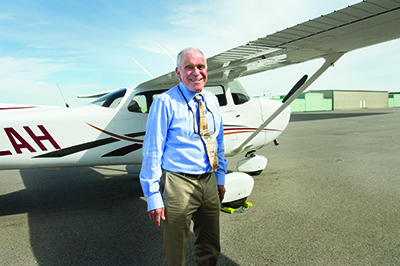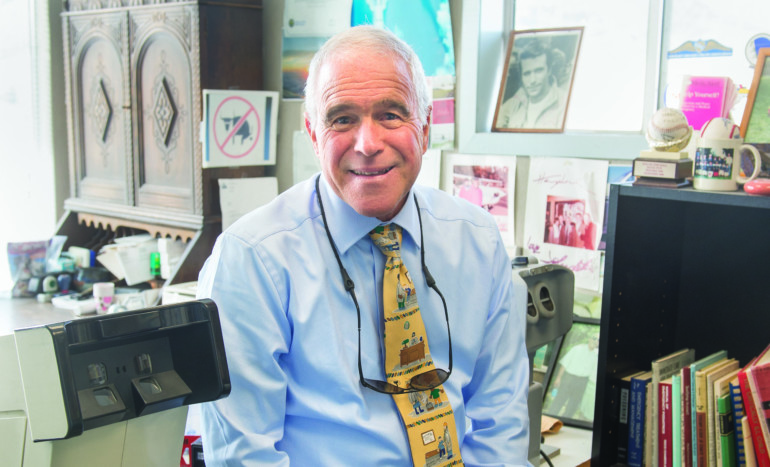 Brooklyn-born Jim Simon fell in love with the Bay Area during a medical internship. He moved back East, but returned in 1978 to buy the Corte Madera home in which he still lives. He’s worked in and run emergency rooms, been a family doctor in Petaluma, practiced occupational health and invented medical devices. Since 1999, Simon has occupied what he calls the “world’s smallest medical office” at Gnoss Field, whose door bears a plaque spelling out, in Braille, his name and official title, Senior Aviation Medical Examiner. What does a flight surgeon do? Every pilot needs a flight physical — airline captains at least annually, depending on their age, and private pilots under 40 every five years; older ones, every two years. What would keep a pilot grounded? You check height and weight, blood pressure, vision. You look in their ears and eyes. You listen to their heart and lungs. Those are the important things. They don’t want you to be blind or pass out. Are your children pilots? One of three is. My oldest son is a professional pilot. I had him on a flight simulator when he was in diapers. At 4, he sat in my lap on the plane. At 16, he soloed. What was more difficult: teaching your son to fly or to drive? Driving. There are all the other drivers doing unpredictable things, and some of them with questionable medical status, questionable visual status and questionably maintained vehicles. It’s real scary out there on the road. You’ve practiced many types of medicine. How did they differ? When I was an ER doc, it was, “My friend shot me.” When I was a family practice doc, it was, “My back, my teeth, my neck, my kids.” In occupational health, it was, “Doc, my pinkie hurts. Can I have the rest of my life off?” For aviation medicine, it’s, “Hi Doc! You look great! No, I’m fine!” How many flight physicals do you perform? Ten to 20 a month. Where do the pilots come from? Reno, Northern California, Southern California, Central Valley. Do they fly in for their physicals? Yes. My joke is you can fly in for your medical, but you might not fly out. That’s funny. It might be the last line of this story. I have a better one. At 15, I wanted to invent medical devices. I wanted to help the blind see, the deaf hear and the lame walk. I have been unable to do that so far, but God has allowed me to be a flight surgeon.
Brooklyn-born Jim Simon fell in love with the Bay Area during a medical internship. He moved back East, but returned in 1978 to buy the Corte Madera home in which he still lives. He’s worked in and run emergency rooms, been a family doctor in Petaluma, practiced occupational health and invented medical devices. Since 1999, Simon has occupied what he calls the “world’s smallest medical office” at Gnoss Field, whose door bears a plaque spelling out, in Braille, his name and official title, Senior Aviation Medical Examiner. What does a flight surgeon do? Every pilot needs a flight physical — airline captains at least annually, depending on their age, and private pilots under 40 every five years; older ones, every two years. What would keep a pilot grounded? You check height and weight, blood pressure, vision. You look in their ears and eyes. You listen to their heart and lungs. Those are the important things. They don’t want you to be blind or pass out. Are your children pilots? One of three is. My oldest son is a professional pilot. I had him on a flight simulator when he was in diapers. At 4, he sat in my lap on the plane. At 16, he soloed. What was more difficult: teaching your son to fly or to drive? Driving. There are all the other drivers doing unpredictable things, and some of them with questionable medical status, questionable visual status and questionably maintained vehicles. It’s real scary out there on the road. You’ve practiced many types of medicine. How did they differ? When I was an ER doc, it was, “My friend shot me.” When I was a family practice doc, it was, “My back, my teeth, my neck, my kids.” In occupational health, it was, “Doc, my pinkie hurts. Can I have the rest of my life off?” For aviation medicine, it’s, “Hi Doc! You look great! No, I’m fine!” How many flight physicals do you perform? Ten to 20 a month. Where do the pilots come from? Reno, Northern California, Southern California, Central Valley. Do they fly in for their physicals? Yes. My joke is you can fly in for your medical, but you might not fly out. That’s funny. It might be the last line of this story. I have a better one. At 15, I wanted to invent medical devices. I wanted to help the blind see, the deaf hear and the lame walk. I have been unable to do that so far, but God has allowed me to be a flight surgeon.
Flight Doc: James "Jim" Simon


